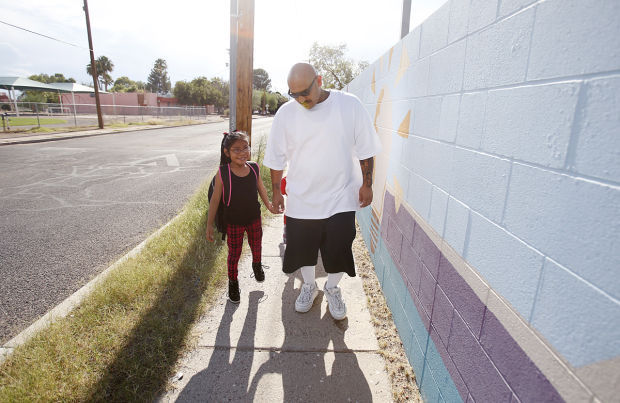Three months after getting out of prison, Rene Varelas is trying to do the right thing.
He’s returned home to South Tucson and taken custody of his two children: Vanessa, 6, and Rene, 4.
But it’s not easy — any parent knows the difficulty of raising young kids, especially alone. As much as you love them, they can make you crazy. Add to that the fact that he has a felony record, having been convicted of aggravated assault, making his job prospects scarce.
“Coming out and being with my kids — I’d been dreaming of that for a long time,” Varelas, 28, told me Friday at his home. “I got out, and it was kinda hard.”
We need people like Varelas to succeed.
As I read through the Star’s series on the rising rate of poverty among Tucson kids, a specter seemed to lurk around the edges of the page — the missing dads. In Pima County, 71 percent of the kids in poverty live with a single parent, and most of those single parents are women. In too many cases, the dads aren’t there, financially or emotionally.
In Arizona, noncustodial parents, the vast majority of them men, owe $1.7 billion in unpaid child support.
Growing up in a single-parent home doesn’t condemn you to poverty, but it makes things harder, especially for boys in homes led by single women.
“The absence of a father seems to be particularly hard on the sons,” Bruce Ellis, a professor of family studies and human development at the University of Arizona, told me Friday. In particular, he said, it appears that fatherless boys have a harder time getting good jobs.
The reasons why haven’t been clearly established, Ellis said, but the phenomenon of the missing father seems to be contributing to a broader problem in society these days: underachieving males.
“Traditionally, up until the last couple of decades, males were higher-achieving than females,” Ellis said. “Boys were more likely to go to high school, graduate college, enter more prestigious jobs. All of that has turned around.”
For a man like Rene Varelas, his childhood made it pretty unlikely he would ever get a prestigious job. Staying out of prison would have been quite an achievement. Raised by his mother, Varelas was taken away by Child Protective Services at age 10 and lived in a series of group homes. Then, four years later, his grandmother won custody.
The damage was done. He got in trouble, spent time in juvenile prisons.
He never knew his dad. Still, when I spoke to Varelas, he referred to the man as “my pops.”
Fatherlessness isn’t the only reason for the malaise among males these days. Dr. Leonard Sax wrote a book called “Boys Adrift: The Five Factors Driving the Growing Epidemic of Unmotivated Boys and Underachieving Young Men,” in which he pointed to changes in the education system as a primary reason boys are doing worse.
When I spoke to Sax, a Pennsylvania physician and psychologist, on Friday, he argued that we have “pathologized boyhood” in school by turning normal male behavior into a big issue. When he was a boy, Sax said by way of example, he used to bite his Pop Tart into the shape of a pistol. Today that could get a boy expelled from school.
Also, he argues in the book, expecting students to learn to read and write as early as kindergarten harms boys, who usually aren’t ready at that age, though girls may be.
“We’ve sent the message loud and clear to boys that school is for girls,” he told me.
Perhaps more important — in my view, though Sax disagrees on this — are the changes in the American economy over the last few decades. The decline in manufacturing and union jobs has meant high-school-educated men have many fewer career options. The work they can get is low-paid with few benefits and no job security.
That has led directly to the rise in single-parenthood, a new study released last week argues, because the lack of good job opportunities means many working-class people no longer view marriage as a viable choice. The study, called “Intimate Inequalities: Love and Work in the 21st Century,” is based on interviews with working-class and middle-class people around the country.
Ellis, the UA professor, puts it this way: “A huge obstacle for fathers that lack resources and are from disadvantaged backgrounds is just believing or understanding at some intuitive level that what they do matters. There’s a huge marginalization of fathers, who may feel they have nothing to contribute.”
If Varelas ever thought that, in the darkest moments in prison, he doesn’t now. A member of the Tohono O’odham tribe, Varelas said he learned a lot in prison, talking with other Native American men.
“Natives were real close” in the racially divided prison population, he said. “We don’t let other people dictate how we do our time.”
Varelas has also learned from his absent father.
“I’m trying to do what he didn’t,” he said. “It’s not about me no more. It’s about the kids.”
Three months out of prison, with that felony record hanging over him, Varelas has found little work. He dreams of being a cook and has signed up to take classes at Pima Community College. But he’d settle for much less.
“I’m real good at custodial work,” he said. “Now it’s kinda hard even doing that.”
But he remains hopeful.
“It’s a big city, it’s a big world out there. Sooner or later someone’s going to give you that chance.”





